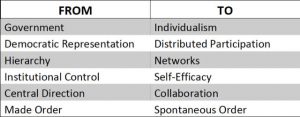The Future Of Work Will Be What You Make It. 8 Principles To Follow.
There’s a lot of disinformation circulating about the future of work, much of it along the lines of “A.I. will eliminate all our jobs”. We’ve presented the more positive case – for example here – which is based on the principles of Interconnected Individualism.
We are each responsible for expanding our opportunities in this emergent era.
Our future is up to us. Self-reliance and self-efficacy are the watchwords of individualism. There is no limit to the opportunities available to each of us. We must take responsibility to identify those opportunities by asking the individual entrepreneur’s questions: Who Am I? What Do I Know? Who Do I Know? What Are My Resources? With this knowledge, the entrepreneur derives further answers to questions like How Do I Contribute? How Do I Serve Others? Technology will be an augmenting factor, helping the individual to answer these questions and support the action plan that emerges.
When we expand our own opportunities, we do the same for others in an interconnected world.
The principle of interconnection is simple. In the new technological age, we are capable of connecting to any one in the world, to all knowledge, and to a vast array of tools and infrastructure. To cite just one example, cloud computing gives each of us access to huge amounts of computing power, in our hand or on our desktop. Global exchange platforms enable market exchanges for talent or services or content all over the planet. Each time we advance our own opportunities, we are doing so in collaboration with others, and serving their purposes at the same time. Interconnected individualism can drive a new era of global growth.
We will be defined by our skills and how we augment them.
The principle of the division of labor is as old as Adam Smith. The more we specialize, the more valuable we become. The pursuit of specialized knowledge and skills becomes more demanding as global exchange expands. It also becomes more rewarding. Everyone in the world who is a buyer of talent and skills can find your profile; if you are unique in filling a specialized niche, demand for your services will be high. When you have defined your niche, collect all the knowledge you can, and utilize the technologies of augmentation to the greatest degree possible. Your personal brand will benefit.
The consumer is still boss –- by making consumer choices we continue to direct market development. An augmented consumer is an even smarter boss.
The basic laws of economics have not been repealed in the age of A.I. Consumers – using the term broadly to include consumers of final goods and services as well as businesses who consume interim goods and services higher up the supply chain – determine what is salable and therefore what is produced. They do so by buying or not buying. With the technology of A/B testing and the capacity to run unlimited numbers of value proposition experiments for unlimited consumer segments, the entrepreneur can quickly find out what sells and what doesn’t. Let the consumer decide – quickly!
The entrepreneur drives innovation, and we can all become entrepreneurs.
The outcome we are contemplating is a universal culture of entrepreneurship. Everyone is an entrepreneur. We can all ask ourselves the entrepreneur’s questions and take action on the answers. We can start a business or join a business, or plan a career or pursue a professional vocation, all with the same entrepreneurial attitude: what is my special opportunity to serve, and how do I implement in a different, better and unique way?
The new spontaneous order can be good for everyone, if we act to make it so, since spontaneous order is the result of human behavior.
The system that emerges from universal individual entrepreneurship can be called spontaneous order. When we each have the opportunity to do our best to serve others, and everyone else gets to give feedback, positive and negative, the system tunes itself. It’s the best and most just social system, without social engineering or central planning. It’s an optimistic and exciting future.
Our values and empathy for others can guide us to meaningful and fulfilling lives.
The essence of entrepreneurship is service to others. The entrepreneur’s value proposition is the offer to make a customer’s life better. To do that, we must understand our customer’s values, through our empathy, and we must reflect those values to be credible and to earn loyalty. There is no more fulfilling life than that of the entrepreneur.
Different forms of organizing, different principles and different metrics and priorities will make the AI transition work for us.
Part of the reason for the pessimism surrounding the possible loss of jobs to robots in the future is the old thinking inherent in the term “jobs”. Jobs are embedded in the old institution of employment, and of employers and employees. Future organizational forms will be a lot different. We can each be independent contractors or individual entrepreneurs. We can join a team, perhaps multiple teams. We can move in an out of teams as the work and project stages change. We will be compensated based on our contribution, as opposed to a negotiated paycheck. We’ll organize our own healthcare, and compile and manage our own networks of collaborators, suppliers and experts. We will be the ones to organize our own economics and revenues, as opposed to joining someone else’s organization. A. I. will not eliminate jobs, because the concept of jobs will be redundant.
This post is an edited extract from The Interconnected Individual, to be published by Business Expert Press, later in 2018.














